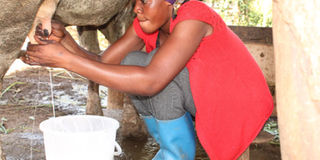Life after decades of war

A patient (Left) is vaccinated against Hepatitis B at a recent sensitisation meeting in Onyopai village in Katakwi District. PHOTO BY SIMON PETER EMWAMU.
Annet Apiyo’s life has been one of pain having been taken captive for eight years at just seven years.
She was abducted by Kony rebels who, at 14 years, forced her into marriage with one of the rebel commanders in the LRA ranks.
At 16 years she became pregnant and gave birth to a baby girl who later died.
However, she was rescued by the UPDF amid gunfire and was later, together with her four-month-old baby taken to Gulu Support Children Organisation, a reception centre for war victims.
During the time, Apiyo says, UPDF would take rescued children to the centre for rehabilitation and eventual integration into the community.
“The centre would extract information from victim, take it to Mega FM which would run announcements to trace relatives of victims,” explains Pamela Anyeko, a social worker with Seeds for Development, a farming charity in Gulu.
However, Apiyo had nobody to take her in and has not yet re-united with her family.
“I was taken to the radio every week to say my name, names of my parents, siblings and my village of Kooch Goma. Still no one came. It dawned on me that my family members and relatives could have been killed,” she says.
Abducted
When the rebels struck, Apiyo was abducted and pleas of her mother not to take her daughter fell on deaf ears.
“My mother pleaded with them not to take me but they refused. A small boy struck her head hard with a spiked club. That is the last time I heard her wailing. She could have been killed,” Apiyo says.
On the night of the raid, Apiyo was taken with her brother who was later killed before they reached River Otichi.
“The head of the rebels asked some little boy to kill him [my brother]. He struck him with a spiked club on the head and his brains splattered all over,” she says with tears easing down her cheeks.
For two days, Apiyo, together with others walked without rest and only stopped at River Otichi, where a camp had been established.
At the camp, Apiyo, together with other captives were trained how to handle guns for about two weeks, before joining a food raiding group.
“We were told we were fighting a holy war. By the time I was 12 years, I was super [gun handling]. I had even developed breasts. There is no raid I was in that failed to bring back food. I was the team leader of seven girls called ‘the ninja girls,” Apiyo says with a smile.
However, the smile quickly fades as she narrate how she was forced into a union with a rebel leader.
“I was in my hut when one rebel woman asked me to join others in the dancing arena. There were seven shirts to pick from. After picking the shirt, the rebel woman told me that the owner of the shirt I had picked was to be my husband. I picked the shirt of Remo Mato (blood sucker), an old man fit to be my grandfather. I hated him too.”
However, I was warned against rejecting him.
“He was old but I had no choice. Mato nicknamed me Lagum (the lucky one),” she says: “As if to say that I was lucky to have picked him.”
So many things happened between the period including torturing me.
On one cold morning, Apiyo woke up with a rush and feeling sickly but it was later discovered that “I was pregnant and it was an experience I least expected at such an early age”.
Nine months later Apiyo gave birth to a baby girl but after about four months the UPDF raided their camp rescued her together with baby after a serious battle at River Otichi, where several rebels were killed.
The two and others were evacuated by a helicopter which took them to Gulu Barracks and later to Gulu Support Children Organisation reception centre.
“At the reception centre, I met an elderly woman who took me and my baby as part of her family.
The elderly woman whose sons spent much of their time in Kampala, took me on a helper at her home in Koro village near Gulu Town.
“She loved me and sheltered me together with my baby,” she says, adding that the baby later died.
During the period, Apiyo joined Warocho Kwon Kwowa a child mothers group. Apiyo found a new home in the group that through support from Alison Hall, a UK national, who rehabilitates child mothers.
The group is also supported by Burnley United FC and Send a Cow, all UK founded organisations.
“Hall has been supportive to us getting us people to train us in beads making, which she assists us to sells in UK,” Apiyo says.
Through Send a Cow, group members are trained in dairy and food crop farming.
Members, who are about 50 in number, also generate income from making beads, tailoring, dancing and singing.
The group recently formed a Sacco, Gulu Women Cooperative Society, through the initiate various development programmes. The Sacco currently has about Shs16m as capital.
Future plans
Apiyo, together with other group members, hope to start a tailoring school and business centre that will enable her establish a clothing business.
“We hope to establish a modelling agency in Gulu Town with our own fashion house.”
She says she is reluctant to get back in marriage but wants to focus on bringing up her daughter in a manner that is not only respectful to humanity but the woman race.
“I want to rehabilitate my life and make money before getting into commitments such as marriage,” she says.




